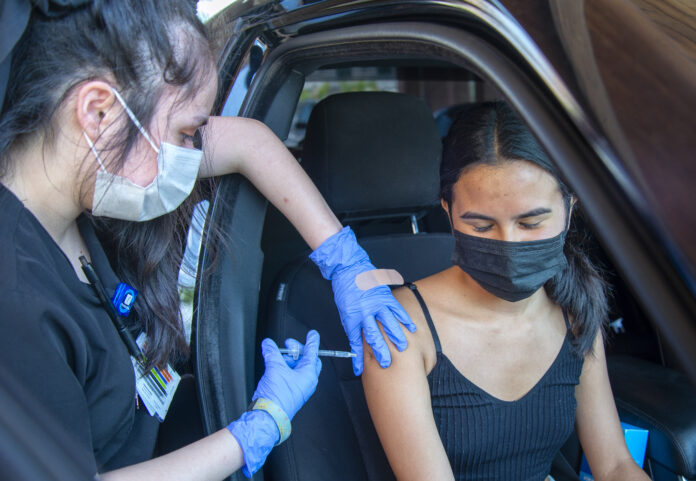HARLINGEN — The health department’s war chest is mounting as it gears up its push to vaccinate those holding out amid a COVID-19 spike that is driving the region’s hospitals near capacity.
The Texas Department of Heath Services is awarding the city a $600,000 grant aimed at targeting unvaccinated residents while better educating the community to dispel misinformation about the COVID-19 vaccine.
The award comes four months after state health officials presented the city with a $1.4 million grant aimed at expanding its vaccination program.
On Wednesday, city commissioners are set to give City Manager Dan Serna the go-ahead to accept the new award.
“The whole point is to increase COVID-19 vaccinations,” Josh Ramirez, the city’s health director, said Monday.
Across the state and the nation, the push is on to reach out into communities to try to vaccinate residents who are holding out on taking the vaccine.
“Citizens still have some doubts,” Ramirez said. “Some are afraid of feeling sick from the effects of the vaccine but data shows we have millions with no side effects.”
Meanwhile, Ramirez is working with Harlingen school district officials to hold vaccination clinics targeting students 12 and older.
So far, the program has vaccinated thousands of the district’s students, he said.
“In the clinics we’ve hosted, the turnout has been great so that gives us some relief that students have received the vaccine,” he said, noting a Saturday clinic is set to administer the Pfizer vaccine’s second and final shot to about 250 students.
Meanwhile, Ramirez is gearing up to launch the vaccination program’s second phase, which will include community vaccination clinics aimed at administering COVID-19 booster shots to protect residents after their vaccinations begin to wane.
Research is showing the COVID-19 vaccine offers protection against the virus for about a year, he said.
As early as next month, he said, residents with weakened immune systems might begin receiving booster shots.
Unvaccinated pushing hospitals near capacity
In the region and across the nation, the more contagious Delta variant is blamed for infecting unvaccinated residents, pushing hospitals near capacity, Ramirez said.
“It is the variant — it’s spreading a lot easier, a lot faster,” he said. “It’s mainly those citizens who are not vaccinated and they spread the virus to other people.”
Ramirez cites Fourth of July celebrations with sparking the latest COVID-19 spike as the Delta variant entered the area.
On May 28, the number of new COVID-19 cases stood at 20 in Cameron County.
By last Friday, the number of daily cases had jumped to 319, County Judge Eddie Treviño Jr.’s office stated.
‘Closing the gap’
In Harlingen and across Cameron County, health officials boast one of the nation’s highest vaccination rates.
Across the Rio Grande Valley, the region is reaching herd immunity, with more than 70 percent of residents fully vaccinated.
“Our numbers show we’re doing great,” Ramirez said.
In Cameron County, 85.6 percent of residents 12 and older have received at least one shot of the vaccine while 70.9 percent are fully vaccinated, according to the state health department.
Meanwhile, 91.2 percent of residents 65 and older have received at least one shot while 82.6 percent are fully vaccinated.
“We want to close the gap,” Ramirez said, referring to the push to target unvaccinated residents.
The Valley’s rate greatly surpasses most of the nation, where 60 percent have received at least one shot and 51 percent are fully vaccinated.
Grant aims to boost vaccination rate
Across Texas, state health officials are awarding grants to 64 communities, aiming to boost vaccination rates while targeting unvaccinated residents, Ramirez said.
With the city’s new $600,000 award, he plans to hire two full-time and four part-time nurses to help administer the vaccine, monitor COVID-19 cases and work to better educate the public on the vaccine.
Out of his staff, a nurse will work with the Harlingen school district to administer the vaccine while educating students, parents and teachers on the vaccine, he said.
In April, state health officials awarded the city a $1.4 million grant aimed at expanding the vaccination program while launching a mobile clinic.
Out of the first grant, officials are setting aside $400,834 to hire personnel to help run the program, including a nurse, a community outreach coordinator and a secretary, Ramirez said.
Meanwhile, officials are tapping $201,086 to purchase a pharmaceutical refrigerator and freezer in which to store the vaccine along with a portable refrigerator to transport doses as part of the mobile clinic, he said.




